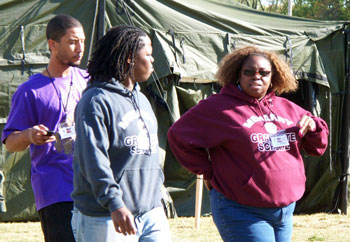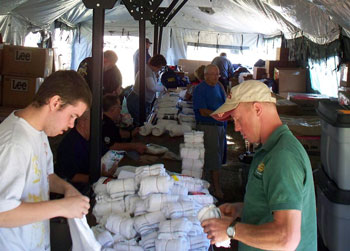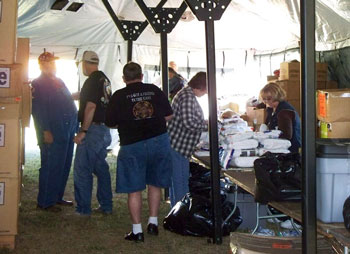October 30, 2010
UAW Veterans Stand Up/Stand Down for Homeless Veterans...
The next generation of American Veterans is on its way home. Military.com reports 1.5 million American troops have served in Iraq or Afghanistan, and tens of thousands more will return from combat over the years to come. As in the aftermath of past wars, after these young men and women put away their uniforms, they will still be coping with the consequences of years spent at war.
When these conflicts have faded from the headlines, will we, as Americans, continue to honor  our yellow-ribbon commitment to “Support the Troops”? Already there are many disturbing signs that we are not prepared to meet that obligation. our yellow-ribbon commitment to “Support the Troops”? Already there are many disturbing signs that we are not prepared to meet that obligation.
The plight of the homeless veteran is a problem that has been sorely overlooked in the U.S. According to the National Coalition of Homeless Veterans it is estimated that there are 500,000 homeless veterans in the U.S. on any given night, or one-third of the entire homeless population. 91% of these homeless Veterans have received an Honorable Discharge. 85% of homeless Veterans have completed high school or have a GED, compared to only 56% of non-veterans.
More than two-thirds of America's homeless veterans served in the armed forces for at least three years, and at least a third of them were stationed in a war zone. Consider these sobering statistics: the number of homeless Vietnam-era veterans is greater than the number of service members who died in that war. Half of these veterans suffer from emotional illness or  substance abuse problems. Many of these veterans are older and more educated than homeless non-veterans; all they need is a fighting chance to put their lives back together. substance abuse problems. Many of these veterans are older and more educated than homeless non-veterans; all they need is a fighting chance to put their lives back together.
Across the UAW nation, veterans are assisting this problem by working/volunteering at Stand Downs. In Region 8 alone, UAW Veterans are working in locations such as, Greensboro, Huntsville, and Atlanta and in Nashville to help address the homeless veteran problem.
In Nashville Oct. 18-24, UAW Veterans from Region 8 assisted the Stand Down staff with various task including the registration of the homeless veterans, tagging and storage of personal items, assigning tent locations for the three nights of safe and warm sleep, packing and distribution of back packs and for the veterans with changes of underclothes and general assistance for veterans with needs and questions or direction.
The military term Stand Down refers to exhausted combat units, requiring time to rest and recover were removed from the battle fields to a place of relative security and safety. At secure base camps, troops were able to take care of personal hygiene, get clean uniforms, enjoy warm meals, receive medical and dental care, mail and receive letters, and enjoy the camaraderie of friends in a safe environment. Today, Stand Down refers to a grassroots, community-based intervention program designed to help the nation’s homeless veterans “combat” life on the  streets. Homeless veterans are brought together in a single location for one to three days and are provided access to the community resources needed to begin addressing their individual problems and rebuilding their lives. Some of the services include, job opportunities, health screenings, legal aid, VA enrollment, affordable housing, substance abuse counseling, transitional programs that can last as long as a year, designed to reacquaint the veteran to a productive society by reintroducing the veteran to the basics; sustaining or gaining employment, staying clean and sober, handling finical matters for themselves, and in general take care and be responsible of themselves and or provide for their families. In the military, Stand Down afforded battle-weary soldiers the opportunity to renew their spirit, health and overall sense of well-being. Today’s Stand Down affords the same opportunity to homeless veterans. streets. Homeless veterans are brought together in a single location for one to three days and are provided access to the community resources needed to begin addressing their individual problems and rebuilding their lives. Some of the services include, job opportunities, health screenings, legal aid, VA enrollment, affordable housing, substance abuse counseling, transitional programs that can last as long as a year, designed to reacquaint the veteran to a productive society by reintroducing the veteran to the basics; sustaining or gaining employment, staying clean and sober, handling finical matters for themselves, and in general take care and be responsible of themselves and or provide for their families. In the military, Stand Down afforded battle-weary soldiers the opportunity to renew their spirit, health and overall sense of well-being. Today’s Stand Down affords the same opportunity to homeless veterans.
According to a 2008 RAND Corporation study nearly 35 percent of military service members who have returned from Iraq and Afghanistan report symptoms of post traumatic stress disorder or major depression. This new generation of combat veterans of Operation Iraqi Freedom and Enduring Freedom (OIF-OEF), both men and women, also suffer from other war related conditions including traumatic brain injuries, and/or other injuries which may also put them at risk for homelessness.
The evolving gender mix of the military--women represent 15% of the military population-- pose's new challenges for the nation’s support system for returning veterans and their families. Women veterans are reporting serious war time trauma histories and episodes of physical harassment and/or sexual assault while serving in the military. The VA and homeless veteran service providers are also seeing increased numbers of veterans with children seeking their assistance.
Mental and physical health problems in addition to the absence of transferable work skills can interrupt veterans’ ability to keep a job, find a home, establish savings, and, in some cases, maintain family stability. The veterans’ family, social and professional networks may have been broken due to extensive mobility while in military service or lengthy periods away from their hometowns and their civilian jobs. Oftentimes these problems are directly traceable to their experience in military service or to their return to civilian society without appropriate  transitional support thus contributing to the rise of younger homeless veterans. transitional support thus contributing to the rise of younger homeless veterans.
Most Americans believe our nation’s veterans are well-supported. In fact, many go without the services they require and are eligible to receive. According to a Congressional staff analysis of U.S. Census data conducted in 2010, one and a half million veterans--nearly 6.3 percent of the nation’s veteran population--have incomes that fall below the federal poverty level, including 634,000 with incomes below 50 percent of poverty. Although the great improvements have been made, neither the VA nor its state and county equivalents are adequately funded to respond to these veterans’ health, housing and supportive services needs adding to the homeless veteran problem. Moreover, community and faith-based service providers also lack sufficient resources to carry the load.
The UAW Veterans are proud to answer the call of this national crisis, donating their time and recourses and being an advocate for homeless veterans. Volunteering at these Stand Downs and VA Medical Centers and clinics brings us in touch with these issues and in reality with the needs of our Nation's greatest citizens...Our Veterans.
Mark Peterson
Region 8 Veterans Council Chairman
Region 8 NVAC member
UAW local 2069, Dublin Va.
|